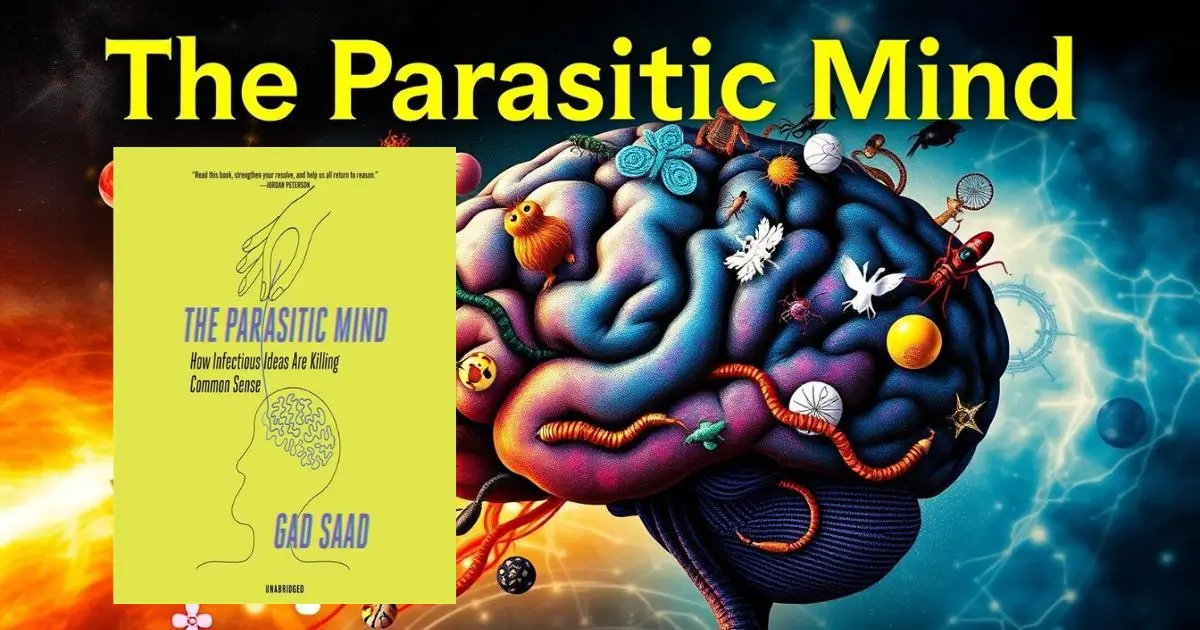In a world where ideas spread faster than ever, not all of them are healthy. Gad Saad’s The Parasitic Mind warns us about a chilling truth: some ideas act like parasites, hijacking our ability to think critically and rationally. These “idea pathogens,” as Saad calls them, thrive on emotional reasoning, stifling logic, and shutting down open dialogue.
Consider this: a recent survey found that over 60% of people feel they can’t freely express their opinions in public without fear of backlash. That’s not just a problem—it’s a crisis of thought. The Parasitic Mind doesn’t just point out the problem; it arms you with tools to reclaim intellectual freedom.
In this summary, we’ll explore the book’s key lessons and discuss how to identify and combat ideological parasites. Whether you’re professionally navigating workplace debates or someone seeking clarity in a world of noise, The Parasitic Mind offers actionable strategies to safeguard your mental independence. Let’s get started!
Table of Contents
5 Key Takeaways from The Parasitic Mind
- The Danger of Idea Pathogens: In The Parasitic Mind, Gad Saad reveals how toxic ideas spread like parasites, infiltrating minds and driving irrational behavior across society.
- The Lifeline of Free Speech: Saad emphasizes the urgent need for open dialogue and debate as the antidote to these harmful mental viruses, safeguarding a healthy and thriving society.
- Postmodernism Under Fire: The book critiques postmodernism for fueling the problem, arguing that its rejection of objective truth and embrace of relativism makes it a breeding ground for destructive ideologies.
- Social Media’s Amplification: Platforms like Twitter and Facebook don’t just connect us; they create echo chambers that magnify harmful ideas, making critical thinking a rare skill in the digital age.
- Evolutionary Psychology’s Insight: Saad explains how our evolutionary wiring makes us vulnerable to certain ideas, offering a deeper understanding of why these mental parasites take hold so easily.
Introduction to Gad Saad’s Revolutionary Work
Gad Saad isn’t just an academic—he’s a fearless thinker taking on the intellectual challenges of our time. As a professor at Concordia University’s John Molson School of Business and the host of The Saad Truth on YouTube, he’s known for tackling politically charged topics with clarity and wit. His book, The Parasitic Mind: How Infectious Ideas are Killing Common Sense, isn’t just another critique of modern culture—it’s a battle cry for intellectual freedom and critical thinking.
Academic Expertise and Authority
With a deep foundation in evolutionary psychology, Gad Saad brings a unique perspective to the table. His expertise isn’t just theoretical; it’s widely respected. The Parasitic Mind boasts a stellar 4.7 out of 5-star rating from over 5,000 readers, a testament to its impact. It’s also a bestseller in the Kindle Store, making waves in the world of thought-provoking literature.
The Genesis of The Parasitic Mind
At its core, The Parasitic Mind is about how bad ideas—what Saad calls “idea pathogens”—infect our thinking. These aren’t just harmless concepts; they’re toxic, spreading through society like viruses. He aims for postmodernism, radical feminism, and identity politics, showing how they erode common sense and rational discourse.
Transforming Modern Discourse
Saad’s work is a wake-up call for anyone invested in preserving intellectual honesty. His insights have fueled a growing pushback against the more extreme fringes of social justice movements, reminding us of the importance of facts over feelings. In The Parasitic Mind, Saad doesn’t just diagnose the problem; he gives us tools to resist, making his book a vital read for anyone who values Western ideals of free speech and critical thinking.
It’s not just a book—it’s a revolution of ideas.
Understanding Idea Pathogens in Modern Society

This stark analogy by Gad Saad, from his groundbreaking book The Parasitic Mind, captures the essence of what’s at stake. These irrational ideas spread like wildfire, bypassing logic and dismantling critical thinking. Saad’s warning? Left unchecked, they lead to censorship, silencing, and the erosion of free thought.
The comparison to biological parasites isn’t just metaphorical. Like parasites hijacking a host’s body, idea pathogens infiltrate our minds, altering how we think and act. We see this play out every day: heated social media debates devolving into echo chambers, de-platforming dissenting voices, and the rise of ideological conformity. These aren’t isolated incidents—they’re symptoms of a society grappling with mental contagion.
But here’s where The Parasitic Mind becomes more than a critique; it’s a toolkit for resistance. Saad argues that defending free speech and fostering open dialogue are essential antidotes. His insights urge us to prioritize facts over feelings, challenge the status quo, and reclaim our capacity for rational discourse.
The Power of Free Speech: A Shield Against Idea Pathogens
In The Parasitic Mind, Gad Saad underscores a fundamental truth: free speech is our most powerful weapon against harmful ideas. Open dialogue and debate aren’t just nice to have—they’re essential. Saad argues that when we allow different viewpoints to surface, we can challenge these toxic ideas head-on, disrupting their spread. But when opposing views are silenced, those very ideas grow stronger.
The lesson here? Embracing debate and conversation isn’t just a matter of politeness; it’s a defense mechanism. By allowing diverse opinions to thrive, we create an environment where irrational ideas can be tested and defeated. On the flip side, shutting down opposition doesn’t eliminate bad ideas—it gives them more room to grow. In this age of ideological polarization, The Parasitic Mind reminds us: that free speech isn’t just a right, it’s our safeguard.
The Postmodernism Dilemma: Relativism vs. Truth

In The Parasitic Mind, Gad Saad aims at postmodernism, accusing it of spreading harmful ideas that reject objective truth. By promoting relativism—the idea that truth is subjective and depends on one’s perspective—postmodernism has paved the way for a culture where feelings are often prioritized over facts. This shift has dangerous implications for society. When emotions outweigh evidence, critical thinking takes a backseat, and rational discourse becomes nearly impossible.
Saad argues that this trend undermines the very foundation of open debate and intellectual progress. The consequences? A fragmented society where truth is no longer universal but is instead shaped by personal preference. This is where the real danger lies, and Saad’s The Parasitic Mind delivers a wake-up call for anyone still holding onto the belief that truth should reign supreme.
The Role of Universities in Spreading Idea Pathogens
In his book, Gad Saad attacks academia for spreading harmful ideas. Saad, a professor for 30 years, says universities now favor groupthink over real knowledge. He believes this harms intellectual diversity and common sense.
Saad is upset about the rise of harmful ideas like postmodernism and radical feminism in universities. He says these ideas attack reason, science, and truth. This decline in education quality is a big worry for him.
- Saad points out the rise of a culture of offense and victimhood in universities. He believes this creates echo chambers and limits free speech.
- He criticizes postmodernism and social constructivism for damaging young minds. These ideas, he says, weaken critical thinking.
The Role of Social Media in Amplifying Idea Pathogens
Saad’s take on social media in The Parasitic Mind is nothing short of eye-opening. He argues that platforms like Twitter and Facebook are more than just spaces for conversation—they’re breeding grounds for echo chambers. These platforms amplify harmful ideas, reinforcing existing beliefs and making it nearly impossible for users to think critically or objectively.
It’s hard to ignore the truth in Saad’s perspective. How many times have we seen debates spiral into polarized arguments, with both sides refusing to consider the other? Social media thrives on this cycle, where irrational ideas are amplified, not challenged. In these echo chambers, nuance gets drowned out, and critical thought is often left in the dust.
It’s a reality that’s hard to escape, but understanding how social media fuels these mental pathogens is the first step toward reclaiming the ability to think for ourselves. The Parasitic Mind doesn’t just point out the problem—it gives us the tools to fight back!
You May Also Like: 15 Life-Changing Books List: Transform Your Mindset Today
Truth-Seeking in an Age of Misinformation
In today’s world, where lies spread fast, it’s crucial to think critically and stay true to facts. Gad Saad’s book, “The Parasitic Mind,” offers great advice on how to find the truth amidst all the lies.
Saad warns us about the danger of thinking we understand things when we don’t. He tells us to always question our beliefs and look for solid evidence. This way, we can learn to spot and fight against false information, staying committed to finding the truth.
Tools for Critical Analysis
Saad gives us powerful tools to analyze what we read and hear. These include:
- Fact-checking – Checking if what we hear is true by looking at reliable sources.
- Identifying cognitive biases – Spotting mental traps like confirmation bias and following the crowd.
- Evaluating logical reasoning – Looking closely at arguments to see if they make sense and are based on facts.
Maintaining Intellectual Integrity
Saad also stresses the need to stay true to ourselves when faced with lies. This means:
- Embracing intellectual humility – Knowing we don’t know everything and being willing to change our minds when we learn something new.
- Fostering a culture of truth-seeking – Creating a space where questioning ideas is valued, and not seen as a problem.
- Resisting the lure of echo chambers – Seeking out different views and avoiding sticking only to what we agree with.
With these tools and values, we can fight against misinformation and keep searching for the truth. Saad’s insights are a beacon for those who want to think deeply and stay true to their beliefs in a world where facts are hard to find.
You May Also Like: Braving the Wilderness by Brené Brown – Book Review
Final Thoughts
Saad’s blend of humor and personal anecdotes makes The Parasitic Mind not just insightful, but genuinely enjoyable. His stories, drawn from his experiences as a professor and public intellectual, offer a refreshing and often entertaining perspective on battling mind viruses. This isn’t just a dry academic text—Saad brings a personal touch that keeps you engaged while exploring complex ideas.
For me, this book was a wake-up call. Saad’s insights into how ideas shape our thoughts and actions are both fascinating and, at times, downright unsettling. But here’s the thing: while Saad convincingly argues the threat of idea pathogens, I felt his perspective could be a bit one-sided. He passionately warns of these mental infections, but sometimes he overlooks the nuances and complexities of the issues he tackles.
Still, his commitment to defending free speech and critical thinking shines through. Saad’s writing is sharp, and accessible, and makes even the most intricate concepts feel digestible. Whether you’re deep into psychology or just curious about the power of ideas in our world, The Parasitic Mind is a book worth picking up.
The Bottom Line
The Parasitic Mind is more than just a thought-provoking read—it’s a challenge to how we think about the ideas that shape us. Saad uses evolutionary psychology to shed light on the spread of harmful ideas, or “mind viruses,” and offers a fresh, unique perspective on how they influence our behavior. It’s not only informative but also incredibly engaging, blending entertainment with serious insights. Even if you don’t agree with every viewpoint Saad presents, the book is packed with valuable takeaways and practical advice.
If you’re looking for a book that will stretch your thinking and give you a new lens on the power of ideas, The Parasitic Mind is a must-read. I’d love to hear your thoughts on it—drop a comment below! And if you’ve already read it, feel free to share any other book recommendations you think are worth exploring!
I review more books and novels, which you can explore in the books section.

